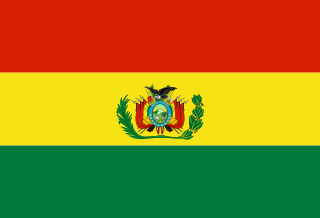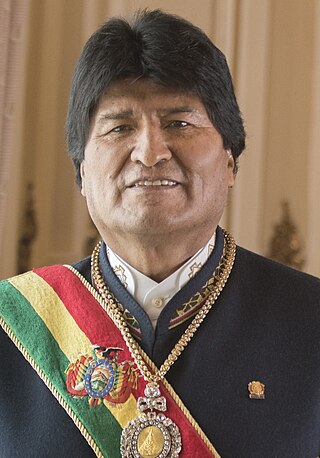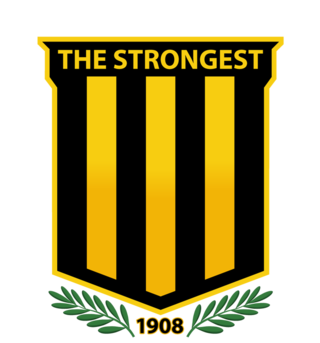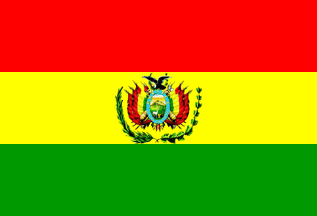Medalists
| Event | Gold | Silver | Bronze |
|---|---|---|---|
| Men's individual trampoline | |||
| Women's individual trampoline | |||
| Men's synchronized trampoline | |||
| Women's synchronized trampoline | — | ||
| Men's double mini | |||
| Women's double mini |
The 2021 South American Trampoline Championships were held in Cochabamba, Bolivia, from December 6 to 13, 2021. [1] [2] The competition was organized by the Bolivian Gymnastics Federation. [3] [4]
| Event | Gold | Silver | Bronze |
|---|---|---|---|
| Men's individual trampoline | |||
| Women's individual trampoline | |||
| Men's synchronized trampoline | |||
| Women's synchronized trampoline | — | ||
| Men's double mini | |||
| Women's double mini |

Bolivia, officially the Plurinational State of Bolivia, is a landlocked country located in central South America. It is a country with the largest geographic extension of Amazonian plains and lowlands, mountains and Chaco with a tropical climate, valleys with a warm climate, as well as being part of the Andes of South America and its high plateau areas with cold climates, hills and snow-capped mountains, with a wide biome in each city and region. It includes part of the Pantanal, the largest tropical wetland in the world, along its western border. It is bordered by Brazil to the north and east, Paraguay to the southeast, Argentina to the south, Chile to the southwest, and Peru to the west. The seat of government is La Paz, which contains the executive, legislative, and electoral branches of government, while the constitutional capital is Sucre, the seat of the judiciary. The largest city and principal industrial center is Santa Cruz de la Sierra, located on the Llanos Orientales, a mostly flat region in the east of the country with a diverse non-Andean culture.

La Paz, officially Nuestra Señora de La Paz, is the seat of government of the Plurinational State of Bolivia. With 755,732 residents as of 2024, La Paz is the third-most populous city in Bolivia. Its metropolitan area, which is formed by La Paz, El Alto, Achocalla, Viacha, and Mecapaca makes up the second most populous urban area in Bolivia, with a population of 2.2 million, after Santa Cruz de la Sierra with a population of 2.3 million. It is also the capital of the La Paz Department.

Sucre is the de jure capital city of Bolivia, the capital of the Chuquisaca Department and the sixth most populous city in Bolivia. Located in the south-central part of the country, Sucre lies at an elevation of 2,790 m (9,150 ft). This relatively high altitude gives the city a subtropical highland climate with cool temperatures year-round. Over the centuries, the city has received various names, including La Plata, Charcas, and Chuquisaca.

The politics of Bolivia takes place in a framework of a presidential representative democratic republic, whereby the president is head of state, head of government and head of a diverse multi-party system. Executive power is exercised by the government. Legislative power is vested in both the government and the two chambers of parliament. Both the Judiciary and the electoral branch are independent of the executive and the legislature. After the 2014 Bolivian general election, 53.1% of the seats in national parliament were held by women, a higher proportion of women than that of the population.

The Bolivian Armed Forces are the military of Bolivia. The Armed Forces of Bolivia are responsible for the defence, both of external and internal, of Bolivia and they are constituted by Bolivian Army, the Bolivian Air Force and the Bolivian Navy. All these institutions depend on the Ministry of Defence of this country.

Bolivia traditionally has maintained normal diplomatic relations with all hemispheric states except Chile. Foreign relations are handled by the Ministry of Foreign Affairs, headed by the Chancellor of Bolivia, Rogelio Mayta.

Juan Evo Morales Ayma is a Bolivian politician, trade union organizer, and former cocalero activist who served as the 65th president of Bolivia from 2006 to 2019. Widely regarded as the country's first president to come from its indigenous population, his administration worked towards the implementation of left-wing policies, focusing on the legal protections and socioeconomic conditions of Bolivia's previously marginalized indigenous population and combating the political influence of the United States and resource-extracting multinational corporations. Ideologically a socialist, he has led the Movement for Socialism (MAS) party since 1998.

Carlos Diego de Mesa Gisbert is a Bolivian historian, journalist, and politician who served as the 63rd president of Bolivia from 2003 to 2005. As an independent politician, he had previously served as the 37th vice president of Bolivia from 2002 to 2003 under Gonzalo Sánchez de Lozada and was the international spokesman for Bolivia's lawsuit against Chile in the International Court of Justice from 2014 to 2018. A member of the Revolutionary Left Front, he has served as leader of Civic Community, the largest opposition parliamentary group in Bolivia, since 2018.

Oruro is a department of Bolivia, with an area of 53,588 km2 (20,690 sq mi). Its capital is the city of Oruro. According to the 2012 census, the Oruro department had a population of 494,178.

The La Paz Department of Bolivia comprises 133,985 square kilometres (51,732 sq mi) with a 2024 census population of 3,022,566 inhabitants. It is situated at the western border of Bolivia, sharing Lake Titicaca with the neighboring Peru. It contains the Cordillera Real mountain range, which reaches altitudes of 6.6 kilometers (22,000 ft). Northeast of the Cordillera Real are the Yungas, the steep eastern slopes of the Andes Mountains that make the transition to the Amazon River basin to the northeast. The capital of the department is the city of La Paz and is the administrative city and seat of government/national capital of Bolivia.

The Bolivia national football team, nicknamed La Verde, has represented Bolivia in men's international football since 1926. Organized by the Bolivian Football Federation (FBF), it is one of the ten members of FIFA's South American Football Confederation (CONMEBOL).

Club The Strongest is a Bolivian professional football club based in La Paz, that currently plays in the Bolivian Primera División.
The Miss Bolivia is a national beauty pageant in Bolivia. The pageant was founded in 1930, and the first winner, Rosa Pizarro Araoz of Tarija, was sent to compete in Miss Latin America held in Miami, United States.

Council of Ministers of Bolivia, or Cabinet of Bolivia, is part of the executive branch of the Bolivian government, consisting of the heads of the variable number of government ministries. The Council of Ministers are ministers of state and conduct the day-to-day business of public administration within Bolivia. The President of Bolivia may freely reorganize the executive branch, with the most recent comprehensive reorganization occurring in February 2009. Since then, the Ministry for the Legal Defense of the State has become the independent office of Solicitor General, and the Ministry of Communication has been created.

Luis Alberto Arce Catacora, often referred to as Lucho, is a Bolivian banker, economist, and politician serving as the 67th president of Bolivia since 2020. A member of the Movement for Socialism, he previously served as minister of finance—later minister of economy and public finance—from 2006 to 2017, and in 2019.

The Armed Forces of Bolivia has four main branches: Army, Navy, Air Force and the National Police Force. Each of the four branches has a similar structure, each having four pay grades: non-commissioned officers, senior non-commissioned officers, commissioned officers and general staff. However, the SNCO roles vary depending on the branch; some of these hold specialisations.

Jeanine Áñez Chávez is a Bolivian lawyer, politician, and television presenter who served as the 66th president of Bolivia from 2019 to 2020. A former member of the Social Democratic Movement, she previously served two terms as senator for Beni from 2015 to 2019 on behalf of the Democratic Unity coalition and from 2010 to 2014 on behalf of the National Convergence alliance. During this time, she served as second vice president of the Senate from 2015 to 2016 and in 2019 and, briefly, was president of the Senate, also in 2019. Before that, she served as a uninominal member of the Constituent Assembly from Beni, representing circumscription 61 from 2006 to 2007 on behalf of the Social Democratic Power alliance.

The COVID-19 pandemic in Bolivia was a part of the worldwide pandemic of coronavirus disease 2019 caused by severe acute respiratory syndrome coronavirus 2. The virus was confirmed to have spread to Bolivia on 10 March 2020, when its first two cases were confirmed in the departments of Oruro and Santa Cruz.